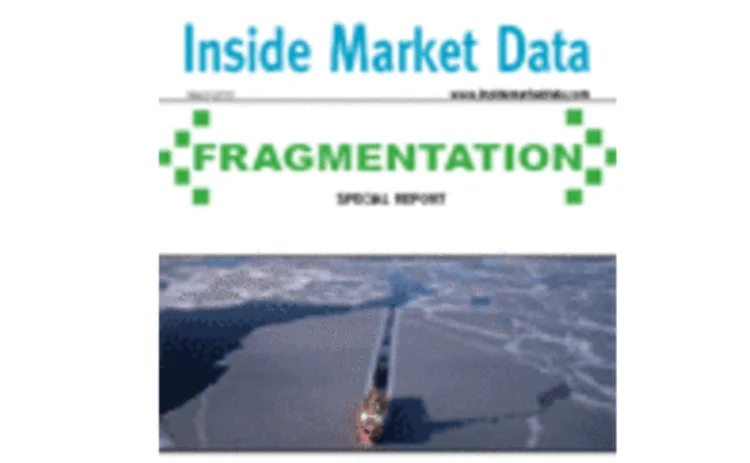Fragmentation special report

Click here to download the PDF
Taping Fragmented Markets Back Together
A few years ago, the London Stock Exchange and Euronext tried competing for trading in stocks listed on each other's markets. Then, neither was able to steal share from the other. But 2007's Markets in Financial Instruments Directive regulation changed that, enabling the creation of new trading venues providing execution in stocks listed on exchanges across Europe.
The move has resulted in lower trading costs by introducing competition to an area previously controlled by large, domestic exchange groups. At the same time, firms seeking to exploit the benefits of these new venues have faced the administrative burden of sourcing data from multiple new venues-even if most multilateral trading facilities initially make their market data available free of charge-to create a definitive "European Best Bid and Offer" price to govern their trading and smart order-routing.
But fragmentation isn't just a European issue. Canada has also seen an influx of new trading venues competing for market share, while many also see potential for competition between markets in Asia Pacific. Even though these markets lack a common currency or regulatory framework, some say that venues with high-frequency trading platforms might attract traders ready to arbitrage latency between different platforms, while the Association of Southeast Asian Nations is already building a trading link between four exchanges, with the aid of NYSE Technologies.
In an article in this report, Fidessa's Andrew Barella notes that-like the Asean marketplaces- Europe does not have a single currency (since the UK still trades in pounds sterling) or regulatory regime. Europe also lacks a single clearing and settlement
mechanism and a "consolidated tape" of equity market data, which are both present
in the US, where equity trading is fragmented between a combination of exchanges
and ECNs. A consolidated tape is a bone of contention for many, who feel that the
fragmentation created by regulation should have been accompanied by a mandated
tape of pan-European data to enable affordable access to information from the new
marketplaces. Even Canada already has a consolidated tape, operated by exchange group TMX.
If a regulator is mandating fragmentation and best execution, should it not also mandate a definitive source of data for best execution?
Click here to download the PDF
Only users who have a paid subscription or are part of a corporate subscription are able to print or copy content.
To access these options, along with all other subscription benefits, please contact info@waterstechnology.com or view our subscription options here: http://subscriptions.waterstechnology.com/subscribe
You are currently unable to print this content. Please contact info@waterstechnology.com to find out more.
You are currently unable to copy this content. Please contact info@waterstechnology.com to find out more.
Copyright Infopro Digital Limited. All rights reserved.
You may share this content using our article tools. Printing this content is for the sole use of the Authorised User (named subscriber), as outlined in our terms and conditions - https://www.infopro-insight.com/terms-conditions/insight-subscriptions/
If you would like to purchase additional rights please email info@waterstechnology.com
Copyright Infopro Digital Limited. All rights reserved.
You may share this content using our article tools. Copying this content is for the sole use of the Authorised User (named subscriber), as outlined in our terms and conditions - https://www.infopro-insight.com/terms-conditions/insight-subscriptions/
If you would like to purchase additional rights please email info@waterstechnology.com
More on Data Management
Chris Edmonds takes the reins at ICE Fixed Income and Data Services
Edmonds is now leading ICE’s fixed income and data business as the rush to provide better data and analytics in fixed income builds.
Deutsche Börse democratizes data with Marketplace offering
Deutsche Börse Group is set to unveil its Marketplace, a one-stop data shop designed to simplify and streamline data acquisition and consumption for its clients, while also surfacing data from across the firm to its own users. Jan Stiebing and Sven…
DSB says industry is ready to meet UPI mandate ahead of deadline
The Unique Product Identifier will be required for certain OTC derivatives in the EU at the end of April, following US adoption in January.
Mapping a successful data journey: strategy, execution and sustainability
A well-planned data journey can positively impact an organization’s long-term trajectory. However, it is important to have clarity not only in the strategy but also in successful execution and sustainability for the long haul, argues data veteran Subbiah Subramanian.
The IMD Wrap: The growing data catalogue space
With their potential to manage costs and surface strategic datasets, it’s no wonder Max gets excited about data catalogs. This week, he takes a look at a new startup entering the space.
LSEG to sunset Redi EMS in favor of Tora
Sources say competitors will look to seize on the decision to win over Redi’s sizeable US client base.
The IMD Wrap: Taking stock of inventory management
With market data and associated costs typically representing a firm’s third-largest expense, there’s a lot of incentive to manage data and its usage more efficiently. Max flings open his fridge to illustrate what’s new in this space.
Most read
- Deutsche Börse democratizes data with Marketplace offering
- Chris Edmonds takes the reins at ICE Fixed Income and Data Services
- Sell-Side Technology Awards 2024: All the winners







